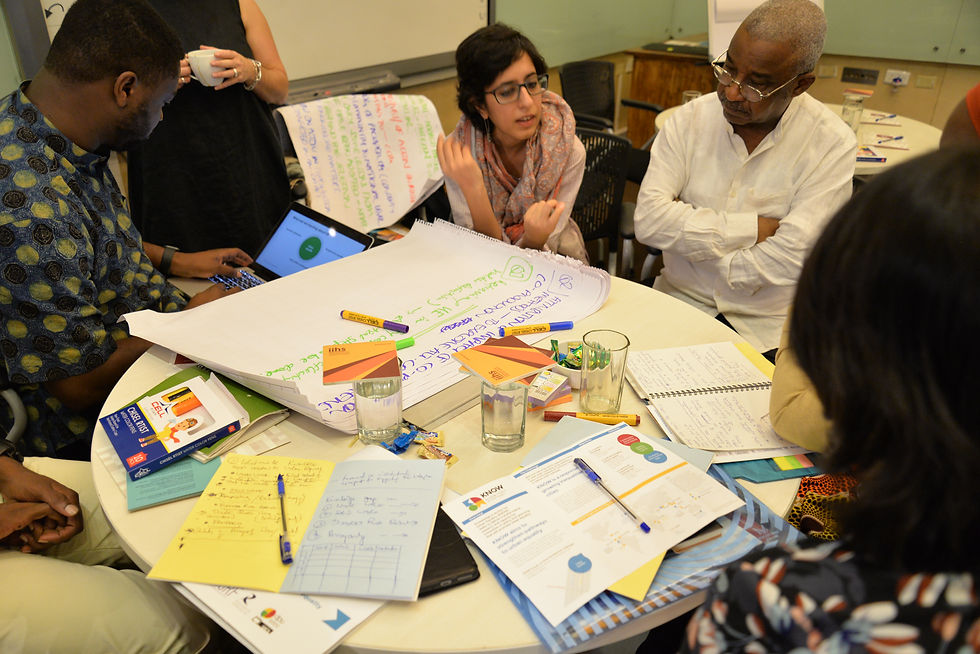My experiences of engaging with the narratives of planning degree alumni from different countries
- Urban-KNOW
- Mar 23, 2021
- 6 min read
By Priya Singh, Work Package 5 Researcher at the Indian Institute for Human Settlements (IIHS)

The introduction of a range of research strategies has stressed the subjective, empathetic, process-oriented, and inclusive sides of social life [1]. It has been suggested that in order to move inquiry and knowledge further along, the researcher should be free to speak as a player in a research project and mix their experience with the experiences of those studied. If a researcher’s voice is omitted from a text, the writing becomes reduced to a mere summary of the works of others, with nothing new added [2]. In this post, I try to use self-observation and self-introspection as a focus of study in and of itself [3]. Growing up and having dealt with educational systems, particularly the professional education system gives me a moment of reflection and when juxtaposed against the narratives coming out from the other narrators, it allows me an opportunity for a self-reflexive piece. What I would like to share in this post is my experience of engaging with the narratives of people coming from such diverse backgrounds. How I try to interact with their stories in a very particular, individualised, and self-reflexive manner and colligate that with my own trajectory and my own spaces, relating personal to the cultural.
When seeking to understand how one’s education influences their practice and the on-ground changes those practices bring about, there are many factors and influences that need to be considered. The KNOW project through its Work Package 5, gives the opportunity to dive deeper into this realm. Whilst working in a cross-national project across boards at multi-institutional level, starting at the smallest level, the individual level, helps the most and that is the approach we adopt in the learner trajectory stream of our research. We look at it from the individual side of things, at folks coming into planning from premier institutions in the countries of India, Tanzania and Thailand. However, we also move away from being interested solely in the individual. To keep the method of life history relevant, our inquiry involves understanding the motivations and influences which the practitioners bring to bear on the contextual realities that they form a part of. The study looks at embedded value systems in higher education space, particularly Planning Education, through the negotiated experiences and resultant narratives of learners going through them. The aim is to understand the ways in which notions of equity and equality are enabled and brought to bear in everyday practice, and the ways in which they fit into larger notions of social justice.

Above: Understanding educational influences and co-creating knowledge with the KNOW Tanzania partners, at the Annual Workshop, 2020, Bangalore. Image by David Heymann, 2020.
Working on the alumni trajectory allowed me to get an in-depth insight into the narratives of these people detailing the importance of planning in an educational trajectory, how people come to it, what goes into choosing this discipline, and once they come into planning what are the various influences of that planning in practice. We interpret narratives of experiences through the idea of sense-making, and approach the study based on the understanding that social reality is not objective rather shaped by ontological human experiences and are thus embedded within their respective social settings. Our main points of inquiry are the characteristics of the individuals in terms of their experiences and backgrounds, their choices and motivations and their challenges and negotiations. So, a qualitative mode of analysis seemed to be a natural choice, which banked on semi-structured questions. Our questions were mostly open-ended, so a lot of narratives came in.
Having spent my whole life in a highly diverse country like India, cross-culture communication was something I learned early on, a quality I found useful when engaging with the accounts coming from people belonging to different countries. Becoming acquainted with the mostly unstructured lived experiences of the respondents, which were more often than not strategic and nonlinear was both satisfying and conscientious. While there is universality to experiences across the board, when interacting with people from countries located in different parts of the globe, which speak different languages, have different cultures and experienced different histories, dissimilitude is to be expected.
One major observation that emerged was the experience of the respondents with language. The structure of language sets up a differentiated experience among them. Having grown up in a multilingual setting, the experience of most Indian students, myself included, is familiarity with more than one language. The agility in shifting between the two languages (the language of the curriculum which is usually English and the language of the country/state) was different at different sites. The importance the education system in India places on the English language ensures that familiarity with the language is there with most of the students, as was seen with the experiences of students coming from a multilingual space similar to me, like the respondents from India. Personally, growing up getting educated in a not-so-fancy English medium school myself, the general attitude of my school was to make us fluent in English, even if fluency and lexicon competence is not achieved in our native language. English proficiency was used as a marker to separate ourselves from the students of state run schools. Our knowledge of a language was used to measure our prowess as a student. In the cities of Dar es Salaam and Bangkok, the respondents talked about low fluency in English being not only a career limiting factor but also one that causes issues of low self-esteem. Knowing English is considered an elementary skill and some respondents encountered their competence as a planner being questioned due to their low fluency in the English language.
Another theme which emerged that I found myself relating with was parental influence in the choice of discipline. These expectations of parents were tied to the broader social acceptability of certain courses and institutions and the still persisting ignorance for others. How some are regarded as more reputed than others and the idea of both institutions and disciplines as following the path of a self-fulfilling prophecy was something which unified these otherwise disparate accounts across the board. Coming from a society that values an education in the sciences and devalues everything else, it was natural that for many of our respondents planning education was not a first choice. They entered planning after being unable to secure a seat in the scientific discipline of their choice in their preferred institutions. Inevitably, I pondered upon my own experiences and of my peers, when we were deciding on what to take up for our higher education. Being someone who herself did not have a higher education in the scientific discipline, I always found myself defending my academic choice as one made due to interest and not the inability to get into the scientific field. This struggle with the societal belief of only the sciences being a contributing discipline and others being more of a hobby than requirement was one, most of us with a willing education in the non-scientific fields have encountered, and this defensiveness of the education choice was something that emerged in a few of our conversations as well, more often than not without prodding.
Cities grow on people very differently. Having spent considerable time in majorly four different cities, when relating my experience of a city with others’ I noticed that people view and evaluate their and other cities depending on their lived experiences. While going through their curriculum, which albeit taught planning but approached it through different lenses, aspects of the city the respondents’ paid attention to were different. At times it was this refined view of the city that solidified the choice of career for some of them. When the narratives of the interviewees talked about how as they progressed in their education, their view of the space around progressed as well, I found myself relating to the changing perception of the space around one with an inflow of new knowledge, from my own experience with this transition. Having grown up and done my higher education in the same city, by the time I left, my understanding of the city was quite different from the one I had during my school days. An appreciation for the city and its people, recognition of the existing flaws, the potential reasons behind them and possible solutions for them, were not just things I noticed and wondered upon but even worked on to actively understand during my higher education
Overall, the general feel of the people from all these different institutions felt somewhat the same. Planning education as a discipline itself, has universality across all these sites. The evolution of the discipline is somewhat similar, in terms of the needs of the people and the imperatives of the global marketplace. While their answers hardly seemed a repetition of each other, a sense of similarity in terms of their experiences, choices, motivations, challenges faced, and negotiations made through this whole journey of coming into the practice of what is broadly considered planning gave a very unifying feel among them. With the approach being individualistic, while no two experiences or trajectories were the same, in fact, different in many ways, a common thread of struggles, negotiations and ultimate place finding weaved this group together.
Footnotes
[1] Neuman, W. L. (1994). Social research methods: Qualitative and quantitative approaches. Needham Heights, MA: Allyn and Bacon.
[2] Clandinin, D. J., & Connelly, F. M. (1994). Personal experience methods. In N. K. Denzin & Y. S. Lincoln (Eds.), Handbook of qualitative research (pp. 413-427). Thousand Oaks, CA: Sage.
[3] Ellis, C. (1991). Sociological introspection and emotional experience. Symbolic Interaction, 14(1), 23-50.
Leading image: View from home, Bangalore, Image by Priya Singh, 2021.
Further links
IIHS
WP5






Comments